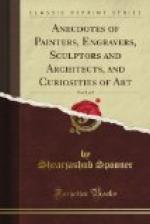6th. The Institution should be located in New York, as the most convenient place, and as the great centre of commerce, where artists could most readily dispose of their works. For this favor, the city would doubtless donate the ground, and her citizens make liberal contributions. The edifice should be built fire-proof, and three stories high—the upper with a skylight, for the gallery of paintings. Such an institution need not be very expensive; yet it would afford the elements for the instruction and accomplishment of the painter, the engraver, the sculptor, the architect, the connoisseur, the archaeologist, and the public at large; it would be the means of awakening and developing the sleeping genius of many men, to the honor, glory, and advantage of their country, which, without it, must sleep on forever. See vol. ii., pp. 149 and 155, and vol. iii., p. 265 of this work.
INDEX.
Advantages of the Cultivation of the Fine
Arts to a Country, i, 6;
Sir M. A. Shoe’s Opinion,
i, 6;
Sir George Beaumont’s,
i, 7;
West’s, i, 8;
Taylor’s, i, 9;
see also, i, 69;
Reynolds’ Opinion, i,
204;
Napoleon’s, iii, 274.
AEtion, his picture of the Nuptials of Alexander and Roxana, ii, 184.
Agaptos, Porticos of, ii, 185.
Ageladus, his works, ii, 185.
Aldobrandini Wedding, Fresco of, ii, 55.
Allston, Washington, i, 60;
his Prayer answered, i, 61;
his success in London, i,
62;
his Death, i, 62;
Vanderlyn’s letter—his
Reflections on his Death, i, 63.
American Patronage at Home and Abroad,
i, 66;
Weir, Greenough, and Cooper’s
testimony, i, 67;
Cooper’s Letter, i,
68.
Amiconi, Jacopo, iii, 249.
Angelo, Michael, his Early Passion for
Art, i, 47;
his Mask of a Satyr, i, 48;
his Sleeping Cupid, i, 48;
Angela and Julius II, i, 50;
St. Peter’s Church,
i, 50;
Angelo and Lorenzo the Magnificent,
i, 52;
his Cartoon of Pisa, i, 53;
his Last Judgment, i, 54;
his Coloring, i, 56;
his Grace, i, 57;
his Oil Paintings, i, 58;
his Prophets and Julius II,
i, 58;
his Bon-Mots, i, 59;
Angelo and Raffaelle, i, 70-72.
Anguisciola, Sofonisba, iii, 129;
her Early Distinction, iii,
129;
her Invitation to Spain iii,
130;
her Marriages, iii, 131;
her Residence at Genoa, her
Honors, and her Intercourse with
Vandyck, iii, 132.
Antique Sculptures in Rome, ii, 159.
Antiquities of Herculaneum and Pompeii, ii, 43.
Antiquity of the Fine Arts, i, 12.
Aparicio, Canova, and Thorwaldsen, i, 236.
Apelles, i, 18;
his Works, i, 18;
his Industry, i, 19;
his Portraits of Philip and
Alexander, i, 19;
his Venus Anadyomene, i, 20;




